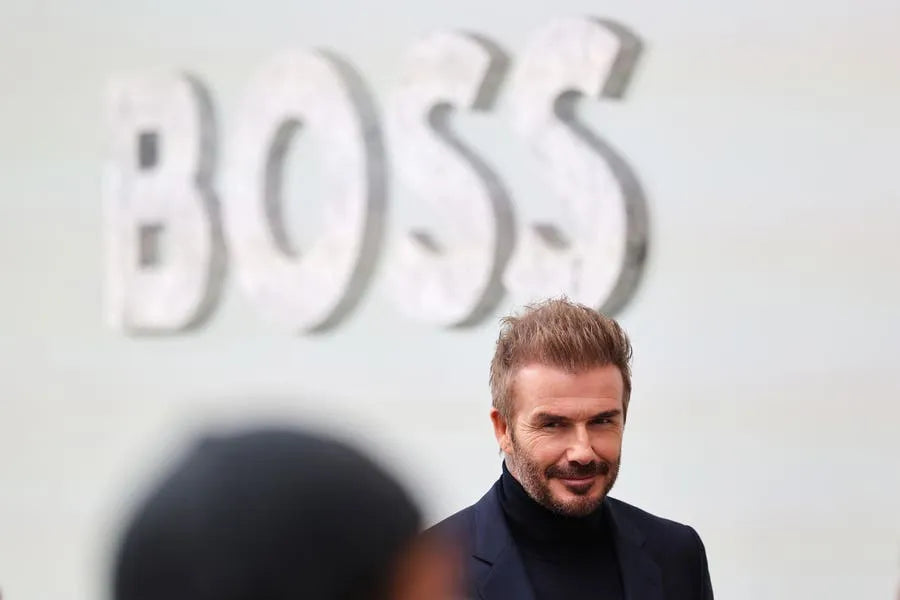
Hugo Boss Faces Shareholder Pressure Amid Growth Strategy and Celebrity Partnerships
Table of Contents
- Key Highlights:
- Introduction
- Activist Shareholder Dynamics
- The Financial Landscape of Hugo Boss
- The Beckham Collaboration: A Double-Edged Sword?
- Strategic Financial Maneuvers
- Embracing E-Commerce and Digital Transformation
- Long-term Vision and Strategic Planning
- Navigating Consumer Trends and Market Challenges
- Conclusion: A Fork in the Road for Hugo Boss
- FAQ
Key Highlights:
- Activist shareholder Frasers Group threatens to vote against dividends, advocating for long-term growth investments at Hugo Boss.
- The fashion house experiences a modest stock increase of 5% following Frasers' public statements, indicating a potentially undervalued position.
- Hugo Boss aims to enhance its brand relevance through partnerships, notably with David Beckham, and plans to outline a new strategic direction by year-end.
Introduction
The German fashion giant Hugo Boss is at a pivotal crossroads as it navigates shareholder pressures while striving for growth in a challenging retail landscape. Frasers Group, led by billionaire Mike Ashley, has emerged as a significant player, acquiring a substantial stake in the company and advocating for a shift in focus from immediate dividend payouts to long-term financial strategies. As Hugo Boss contemplates its future, the influence of shareholder activism and the integration of celebrity partnerships, such as its collaboration with David Beckham, highlight the evolving dynamics of brand management and investment in the fashion industry.
Activist Shareholder Dynamics
Frasers Group's intervention in Hugo Boss is emblematic of a broader trend where activist investors leverage their stakes to influence corporate strategies. With a 25% voting right in the fashion house, Frasers has positioned itself as a critical voice, urging management to prioritize long-term growth over short-term financial returns. This approach is not new for Ashley, who has historically utilized his retail influence to impact corporate governance across various brands.
The company's response to Frasers' statements reveals a willingness to engage in constructive dialogue, signaling an openness to reconsider its strategies. The interplay between shareholder activism and corporate governance raises important questions about the balance between immediate financial performance and sustainable growth strategies in a rapidly changing retail environment.
The Financial Landscape of Hugo Boss
Recent financial reports indicate that Hugo Boss is experiencing a complex market environment. In its latest quarter, the company reported slight declines in revenue across key regions, including EMEA, the Americas, and Asia/Pacific. This decline was partially offset by growth in its digital business, which reflects a broader trend in the retail sector where e-commerce is becoming increasingly vital.
Despite these challenges, Hugo Boss has maintained a cautious yet optimistic outlook for the future. The company anticipates stable sales for the full year of 2025, indicating a strategic focus on maintaining brand relevance and consumer engagement. This outlook is crucial as it navigates macroeconomic uncertainties that continue to influence consumer sentiment.
The Beckham Collaboration: A Double-Edged Sword?
Hugo Boss's partnership with David Beckham represents a significant strategic initiative aimed at rejuvenating the brand's image and appeal. The Boss One bodywear campaign, co-designed with Beckham, seeks to leverage the celebrity’s global influence and style to attract a younger demographic. This collaboration is part of a broader trend in the fashion industry where brands align with well-known personalities to enhance their market presence.
However, the success of such partnerships is contingent upon effective execution and alignment with the brand's core values. While Beckham’s celebrity status can generate buzz and attract attention, Hugo Boss must ensure that this collaboration translates into tangible sales and strengthens its overall brand equity. The company has indicated that it is committed to optimizing its marketing strategies to maximize the impact of this partnership, a critical step in an increasingly competitive market.
Strategic Financial Maneuvers
In response to shareholder concerns, Hugo Boss is exploring various financial strategies, including the potential redemption of treasury shares. This move could signal a commitment to increasing shareholder value and addressing the concerns raised by Frasers Group. By redeeming shares, Hugo Boss may enhance its stock value, reflecting positively on its financial management and responsiveness to shareholder interests.
Furthermore, the recent establishment of a commercial paper program enables Hugo Boss to diversify its funding sources, allowing for greater flexibility in capital management. This initiative demonstrates the company's proactive approach to navigating financial challenges and expanding its access to capital markets, positioning it for future growth.
Embracing E-Commerce and Digital Transformation
The retail industry is undergoing a significant transformation, driven by the rise of e-commerce and changing consumer behaviors. Hugo Boss's digital sales growth of 4% in the latest quarter illustrates its commitment to adapting to this shift. By investing in its online presence and enhancing the customer experience, the brand is positioning itself to capture market share in an increasingly digital landscape.
The challenges faced in brick-and-mortar retail, including a 4% decline in physical store sales, underscore the necessity for Hugo Boss to pivot strategically. This shift not only involves enhancing its online platforms but also optimizing its supply chain and logistics to meet the demands of a rapidly evolving market. The ability to seamlessly integrate digital and physical retail experiences will be crucial for the brand's longevity and relevance.
Long-term Vision and Strategic Planning
Looking ahead, Hugo Boss is set to outline a new strategic direction during its upcoming capital markets day. This event will provide an opportunity for the company to articulate its vision for the future, addressing both shareholder concerns and market expectations. The emphasis on long-term growth initiatives, coupled with proactive financial management, will be essential in reinforcing investor confidence.
As the company navigates its relationship with Frasers Group, maintaining transparency and open communication will be vital. The fashion house's ability to balance shareholder demands with its strategic objectives will define its trajectory in the coming years.
Navigating Consumer Trends and Market Challenges
Hugo Boss operates within a complex market environment characterized by fluctuating consumer preferences and economic uncertainty. The company's focus on brand and product initiatives, such as the Beckham collaboration, will be critical in responding to these challenges. Understanding the nuances of consumer behavior and adapting product offerings accordingly will be key to maintaining relevance in the fashion industry.
Moreover, the ongoing economic pressures, particularly in key markets like China, necessitate a thoughtful approach to pricing and product positioning. By aligning its offerings with consumer expectations and preferences, Hugo Boss can enhance its market presence and drive sustainable growth.
Conclusion: A Fork in the Road for Hugo Boss
Hugo Boss stands at a crossroads, facing both challenges and opportunities as it seeks to redefine its market position. The influence of activist investors like Frasers Group underscores the need for a strategic approach that balances immediate financial performance with long-term growth. As the company continues to navigate this landscape, its partnerships, financial strategies, and consumer engagement will play pivotal roles in shaping its future.
FAQ
What is Frasers Group's relationship with Hugo Boss? Frasers Group, led by Mike Ashley, is a significant shareholder in Hugo Boss, holding 25% of the voting rights. The group has been vocal about its desire for the company to focus on long-term growth rather than immediate dividend payouts.
How has Hugo Boss responded to shareholder concerns? Hugo Boss has engaged in constructive dialogue with Frasers Group and is considering the redemption of treasury shares as part of its strategy to enhance shareholder value.
What role does David Beckham play in Hugo Boss's strategy? David Beckham's collaboration with Hugo Boss is aimed at revitalizing the brand's image and attracting younger consumers through targeted marketing campaigns.
How is Hugo Boss addressing the decline in brick-and-mortar sales? The company is focusing on enhancing its digital sales and optimizing its supply chain to adapt to changing consumer behaviors and preferences.
What can we expect from Hugo Boss in the future? Hugo Boss is set to outline a new strategic direction at its upcoming capital markets day, focusing on long-term growth initiatives, financial flexibility, and maintaining brand relevance in a competitive market.
POWER your ecommerce with our weekly insights and updates!
Stay aligned on what's happening in the commerce world
Email Address
Handpicked for You
05 September 2025 / Blog
Merchant Services 2025: Comparing the Top 12 Payment Providers and How to Choose the Right One for Your Business
Read more
05 September 2025 / Blog
How to Build Accurate Apparel Size Charts That Cut Returns and Boost Online Sales
Read more
05 September 2025 / Blog


